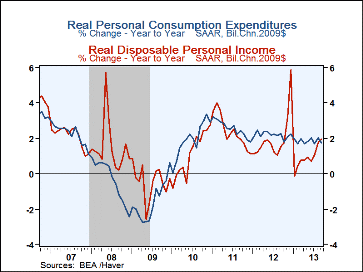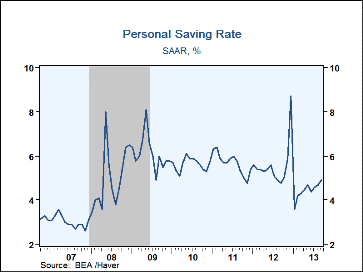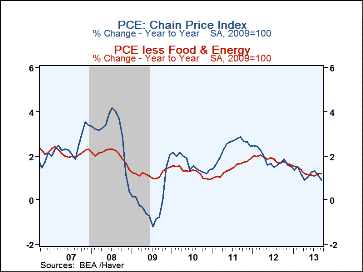 Global| Nov 08 2013
Global| Nov 08 2013U.S. Personal Income Increase Remains Firm
by:Tom Moeller
|in:Economy in Brief
Summary
Personal income in September increased 0.5% (3.7% y/y) following a 0.5% August rise. The gain beat expectations for a 0.3% increase. It reflected outsized increases of 1.9% (12.2% y/y) in proprietors income and 1.1% (10.3% y/y) in [...]
 Personal income in September increased 0.5% (3.7% y/y) following
a 0.5% August rise. The gain beat expectations for a 0.3% increase. It
reflected outsized increases of 1.9% (12.2% y/y) in proprietors income and
1.1% (10.3% y/y) in rental incomes. Wages and salaries rose a moderate
0.4% (3.0% y/y). Personal dividend income increased 0.6% (9.6% y/y) while
transfer receipts edged up 0.2% (3.8% y/y). Personal interest earnings
notched 0.2% lower (+4.0% y/y) for the third straight month. Disposable
income increased 0.5% (2.9% y/y) and, when adjusted for inflation, went up
by 0.4% (2.0% y/y).
Personal income in September increased 0.5% (3.7% y/y) following
a 0.5% August rise. The gain beat expectations for a 0.3% increase. It
reflected outsized increases of 1.9% (12.2% y/y) in proprietors income and
1.1% (10.3% y/y) in rental incomes. Wages and salaries rose a moderate
0.4% (3.0% y/y). Personal dividend income increased 0.6% (9.6% y/y) while
transfer receipts edged up 0.2% (3.8% y/y). Personal interest earnings
notched 0.2% lower (+4.0% y/y) for the third straight month. Disposable
income increased 0.5% (2.9% y/y) and, when adjusted for inflation, went up
by 0.4% (2.0% y/y).
Personal consumption expenditures matched expectations and improved 0.2% (2.7% y/y) last month, down from a 0.3% August rise. Motor vehicle purchases fell 3.6% (+2.7% y/y) and spending on clothing edged 0.5% lower (+1.4% y/y). These declines were countered by a 0.1% uptick (4.4% y/y) in spending on furniture and a 0.3% rise (2.9% y/y) in outlays on services.
The personal savings rate moved up to 4.9%, its highest level since December. The total value of personal savings increased 6.4% during the last twelve months.
The PCE chain price index in September inched 0.1% higher (1.2% y/y) for the third straight month. Durable goods prices were unchanged (-1.8% y/y) while prices for nondurables also were unchanged (-0.6% y/y). Services prices ticked up 0.1% (1.9% y/y). Less food & energy, the chain price index rose 0.1% (1.2% y/y) for the third consecutive month.
The personal income & consumption figures are available in Haver's USECON and USNA databases. The consensus expectation figure is in the AS1REPNA database.
| Personal Income & Outlays (%) | Sep | Aug | Jul | Y/Y | 2012 | 2011 | 2010 |
|---|---|---|---|---|---|---|---|
| Personal Income | 0.5 | 0.5 | 0.2 | 3.7 | 4.2 | 6.1 | 2.9 |
| Wages & Salaries | 0.4 | 0.5 | -0.3 | 3.0 | 4.3 | 4.1 | 2.0 |
| Disposable Personal Income | 0.5 | 0.5 | 0.3 | 2.9 | 3.9 | 4.8 | 2.8 |
| Personal Consumption Expenditures | 0.2 | 0.3 | 0.1 | 2.7 | 4.1 | 5.0 | 3.8 |
| Personal Saving Rate | 4.9 | 4.7 | 4.6 | 4.8 (Sep'12) |
5.6 | 5.7 | 5.6 |
| PCE Chain Price Index | 0.1 | 0.1 | 0.1 | 0.9 | 1.8 | 2.4 | 1.7 |
| Less Food & Energy | 0.1 | 0.1 | 0.1 | 1.2 | 1.7 | 1.4 | 1.3 |
| Real Disposable Income | 0.4 | 0.4 | 0.2 | 2.0 | 1.7 | 2.4 | 1.1 |
| Real Personal Consumption Expenditures | 0.1 | 0.2 | 0.0 | 1.7 | 2.2 | 2.5 | 2.0 |
Tom Moeller
AuthorMore in Author Profile »Prior to joining Haver Analytics in 2000, Mr. Moeller worked as the Economist at Chancellor Capital Management from 1985 to 1999. There, he developed comprehensive economic forecasts and interpreted economic data for equity and fixed income portfolio managers. Also at Chancellor, Mr. Moeller worked as an equity analyst and was responsible for researching and rating companies in the economically sensitive automobile and housing industries for investment in Chancellor’s equity portfolio. Prior to joining Chancellor, Mr. Moeller was an Economist at Citibank from 1979 to 1984. He also analyzed pricing behavior in the metals industry for the Council on Wage and Price Stability in Washington, D.C. In 1999, Mr. Moeller received the award for most accurate forecast from the Forecasters' Club of New York. From 1990 to 1992 he was President of the New York Association for Business Economists. Mr. Moeller earned an M.B.A. in Finance from Fordham University, where he graduated in 1987. He holds a Bachelor of Arts in Economics from George Washington University.
More Economy in Brief
 Global| Feb 05 2026
Global| Feb 05 2026Charts of the Week: Balanced Policy, Resilient Data and AI Narratives
by:Andrew Cates








